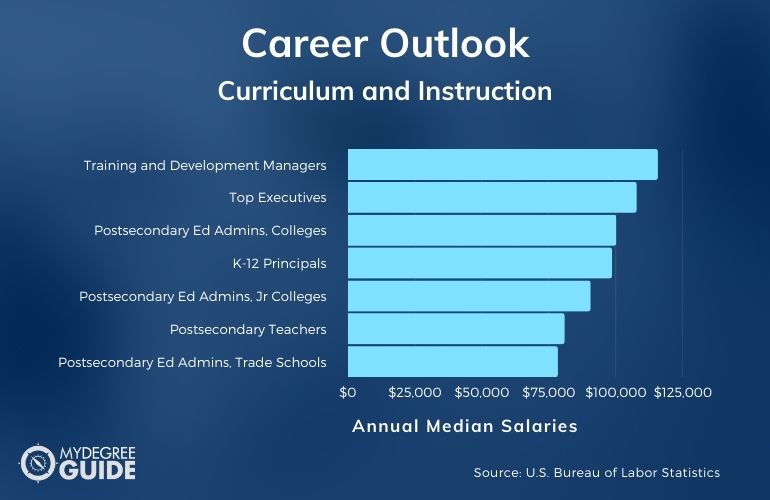While earning an online EdD in Curriculum and Instruction, you’ll study the management and design of curriculum programming.

Pursuing a doctorate in education allows you to amplify your qualifications so you can adapt to more professional leadership roles, such as administrative positions in educational institutions.
Editorial Listing ShortCode:
This type of EdD program can help prepare you to take charge of the adoption and implementation of transformative curriculum and instruction development.
Universities Offering Online Doctorate in Curriculum and Instruction Degree Programs
Methodology: The following school list is in alphabetical order. To be included, a college or university must be regionally accredited and offer degree programs online or in a hybrid format.
Andrews University
Andrews University offers an EdS, an EdD, and a PhD in Curriculum and Instruction. While the EdS program only requires 32 credits to graduate, both the EdD and the PhD require 61 credits.
Applicants for the EdS must have a GPA of 3.2, while those applying for the EdD or PhD need a GPA of 3.3. When applying, 2 letters of recommendation must be submitted.
Andrews University is accredited by the Higher Learning Commission.
Baker University
Baker University offers an online EdD in Instructional Design and Performance Technology program. Students must achieve at least 59 credits and an overall GPA of 3.5. No grades below a B can be counted towards graduation. Applicants must have 4 references and a GPA of 3.5 or higher to be eligible.
Baker University is accredited by the Higher Learning Commission.
Capella University
Capella University offers a PhD in Education and an EdD. Both programs offer a range of specializations that students may choose to take. Students in the EdD program must finish a capstone project to graduate. Applicants must have a GPA of 3.0 or higher and must have a master’s degree.
Capella University is accredited by the Higher Learning Commission.
Carson-Newman University
Carson-Newman University offers a Doctorate in Education with a focus in Administrative Leadership. The program requires 57 credits and a dissertation and can typically be completed in 3 years. Each course lasts for 8 weeks. Applicants must submit official transcript and GRE scores when applying.
Carson-Newman University is accredited by the Southern Association of Colleges and Schools Commission on Colleges.
Columbus State University
Columbus State University offers an online EdD in Curriculum and Leadership. A total of 63 credits, including a dissertation, are needed to graduate. Students may choose between 3 specializations: Curriculum, Educational Leadership, or Higher Education Administration. Applicants must have a GPA of 3.5 and provide a criminal background check.
Columbus State University is accredited by the Southern Association of Colleges and Schools Commission on Colleges.
Evangel University
Evangel University offers a Doctor of Education in Educational Leadership Curriculum and Instruction. Students must complete 50 credits and have the option to transfer in up to 15 qualifying credits. A dissertation is required. Applicants must have a GPA of 3.0 to be eligible for the program and must complete an entrance exam.
Evangel University is accredited by the Higher Learning Commission.
Georgia Southern University
Georgia Southern University offers a Doctorate of Education in Curriculum Studies for students who are currently working. Students must maintain a GPA of 3.25 and cannot receive grades that are C or lower in 2 or more courses. Applicants must have a GPA of 3.25 or higher and 3 letters of recommendation. An interview may be required.
Georgia Southern University is accredited by the Southern Association of Colleges and Schools Commission on Colleges.
Kansas State University
Kansas State University offers an Ed.D in Curriculum and Instruction. Students must complete 94 credit hours with a dissertation and doctoral research. Each semester, students are expected to complete an internship. Applicants must have a GPA of 3.0 or higher, 3 letters of recommendation, and a resume.
Kansas State University is accredited by the Higher Learning Commission.
Liberty University
Liberty University offers an online PhD in Curriculum and Instruction program. A total of 60 credits are needed to graduate, and courses are 8 weeks long. Students can choose to transfer in up to 50% of the required credits to the program if they have qualifying credits. Applicants must have a GPA of 3.0 or higher.
Liberty University is accredited by the Southern Association of Colleges and Schools Commission on Colleges.
Regent University
Regent University offers a PhD in Education. Students must complete 67 credits and must choose between 11 different specialties. A dissertation is needed to graduate. Applicants must complete an admission questionnaire and an interview. Students accepted into the program must check in two weeks before their first semester.
Regent University is accredited by the Southern Association of Colleges and Schools Commission on Colleges.
Sam Houston State University
Sam Houston State University offers an EdD in Instructional Systems Design and Technology. Students must complete 60 credit hours to graduate. A dissertation and passing an examination are also required to graduate. Applicants must have 3 letters of recommendation, 3 years of experience, GRE scores, and all official transcripts.
SHSU is accredited by the Southern Association of Colleges and Schools.
Southeastern University
Southeastern University offers an online Doctor of Education program with the option to add one of two specialties: Organizational Leadership or Curriculum and Instruction. The courses in this program last for 8 weeks. A dissertation is needed to graduate. Applicants must have a GPA of 3.0 and 2 letters of recommendation.
Southeastern University is accredited by the Southern Association of Colleges and Schools Commission on Colleges.
Southern Wesleyan University
Southern Wesleyan University offers an online Doctor of Education program. Students must complete 54 credits. Each course lasts for 7 weeks, and the program usually takes 36 months to complete. Applicants must complete either the GRE or the MAT, have a GPA of 3.0, and submit two letters of reference to be eligible.
Southern Wesleyan University is accredited by the Commission on Colleges of the Southern Association of Colleges and Schools.
Texas A&M University – College Station
Texas A&M University offers an online Doctor of Education program. Students need to complete at least 64 semester hours and two internships of at least 3 semester hours. Students learning online may not transfer credits into the program. Applicants must have a master’s degree and 5 years of teaching experience to be eligible.
Texas A&M University is accredited by the Southern Association of Colleges and Schools Commission on Colleges.
University of Florida
The University of Florida offers an online EdD in Curriculum and Instruction with a specialization in Teachers, Schools, and Society. Students must have at least 90 credit hours and a doctoral dissertation that they have successfully defended to graduate. Applicants must have a GPA of 3.0 or higher and 3 years of experience.
The University of Florida is accredited by the Southern Association of Colleges and Schools Commission on Colleges.
University of Louisiana – Monroe
The University of Louisiana—Monroe offers an online Doctor of Education, Curriculum, and Instruction program. Students must complete 60 credit hours to graduate and can typically finish the program within 2 years. Applicants must have a master’s degree in any field with a minimum GPA of 3.25 and either a GRE score of 292 or a MAT score of 397.
The University of Louisiana Monroe is accredited by the Southern Association of Colleges and Schools Commission on Colleges.
University of Memphis
The University of Memphis offers an online program for a Doctorate of Education in Instruction and Curriculum Leadership with an emphasis in Instructional Design and Technology.
A total of 54 credit hours are needed to graduate. Courses are either 7 or 14 weeks long. Applicants must complete an entrance examination and submit the score to be eligible.
The University of Memphis is accredited by the Commission on Colleges of the Southern Association of Colleges and Schools.
University of South Carolina
The University of South Carolina offers an online Doctor of Education in Curriculum Studies program. To graduate, students must complete 48 credit hours, including a 12 credit dissertation.
Those interested in the program must submit all official transcripts, 2 letters of recommendation, a personal statement, a resume, and a scholarly writing sample when applying.
The University of South Carolina is accredited by the Southern Association of Colleges and Schools Commission on Colleges.
University of Toledo
The University of Toledo offers a PhD in Curriculum and Instruction with a focus on Special Education.
Students must complete 60 credit hours within 4 to 5 years to graduate. Students will also need to finish a virtual internship. Applicants must have a master’s degree in a relevant field and must submit GRE scores that have been obtained within the past 5 years.
The University of Toledo is accredited by the Higher Learning Commission.
University of West Florida
The University of West Florida offers a Curriculum and Instruction EdD with an emphasis in Curriculum and Assessment. Courses last for 8 weeks, and the program spans 32 months, plus dissertation hours. Students can transfer up to 10 qualifying credits into the program. Applicants must have a GPA of 3.5 or higher alongside a letter of intent.
The University of West Florida is accredited by the Southern Association of Colleges and Schools Commission on Colleges.
Online EdD in Curriculum and Instruction Programs

An EdD in Curriculum and Instruction online program helps provide you with the necessary training to pursue a leadership role in the administration of educational institutions.
You can learn to develop methods to help improve curriculum and educational instruction. You may also find yourself immersed in research that aims to better comprehend student needs and help create pathways to student success.
A doctorate in curriculum and instruction is useful for working in the administration of all levels of the education industry. You may find yourself in the position of superintendent or student success coordinator. If you prefer working behind-the-scenes, you may want to work in the head office of school districts as a specialized administrator.
The following are some common course topics you may come across in this type of program:
- Theory and trends. You’ll study data on student experiences and develop methods to improve and amplify student success.
- Improving classroom instruction. Following the study of specific student examples, you’ll develop ways to properly adapt to student needs.
- Educational policies. You’ll look at the laws and regulations of education. This can also help you can develop improvements for the American school system.
- Issues in education. You’ll look at socioeconomic, gender, race, and sexuality issues associated with student success, and you’ll learn how to diversify the curriculum to serve those needs.
While courses vary from school to school, you may find yourself immersed in these important topics that can help you develop the necessary skills to become a leader in education.
EdD in Curriculum and Instruction Concentrations

When considering online doctoral programs in curriculum and instruction, there are various concentrations that you may wish specialize in.
- Educational Technology. As technology becomes a leading factor in instruction, educational leaders need to know technology best practices. This includes learning how to properly implement new tools into classroom instruction, adapting to changes, and anticipating technological trends in education.
- Learning and Development. This concentration focuses on the design and implementation of an impactful curriculum. In addition, it looks at instructional development through the research of case studies and exemplars.
- Multicultural or Bilingual. Through this concentration, you can become well-versed in the ethics of education. This specialization gives you a better understanding of the diversity of students and how to adapt instruction to their needs. If you are interested in social justice issues and how they intertwine with education, this concentration is ideal for you.
- Leadership. This concentration helps you develop your supervision, planning, development, and improvement skills in order to become a successful administrator in an educational institution. You’ll study community developments and professional development for educators, and you’ll research curriculum and instruction in order to create more effective frameworks.
- Curriculum and Assessment. This is a heavily data-based concentration. You’ll evaluate the results of mathematical and literacy testing and formulate more effective assessment and instruction opportunities for school districts. You’ll also be responsible for using that data to develop benchmarks for student success.
Although it is not necessary to choose a concentration for your Ed.D. in Curriculum and Instruction, you may find that one or two specializations align with your career goals.
Curriculum and Instruction Careers & Salaries

A doctorate in curriculum and instruction is a useful degree path to take if you wish to become a leader in an educational institution. This doctoral program in education can help open up doors to administrative roles as well as other career opportunities.
According to the Bureau of Labor Statistics, employment in education is expected to grow 5% in the next decade. Here are some of the potential careers you may pursue with a doctorate in curriculum and instruction.
| Careers | Annual Median Salaries |
| Training and Development Managers | $115,640 |
| Top Executives | $107,680 |
| Postsecondary Education Administrators, Colleges, Universities, and Professional Schools | $100,060 |
| K-12 Principals | $98,490 |
| Postsecondary Education Administrators, Junior Colleges | $90,470 |
| Postsecondary Teachers | $80,790 |
| Postsecondary Education Administrators, Technical and Trade Schools | $78,290 |
| Instructional Coordinators, K-12 | $70,270 |
| Instructional Coordinators, Educational Support Services | $67,240 |
| Instructional Coordinators, Colleges, Universities, and Professional Schools | $62,950 |
There are many specialized paths you can choose from following your EdD in Curriculum and Instruction. With an EdD, many career routes lead to higher than average salaries.
How to Choose a Curriculum and Instruction Doctoral Degree Program

When choosing which curriculum and instruction doctoral degree program is best for you, it can be helpful to consider the following questions:
- Which specialization are you interested in? You’ll typically want a program that offers courses aligned with your concentration interest. Some schools focus their degree solely on a concentration, so it’s strategic to look at the curriculum offered by each school prior to making your decision.
- Do you plan to enroll in a part-time or full-time program? Your school choice needs to be adaptable to your schedule.
- How much are you willing to pay? Tuition rates vary from school to school, so you may want to locate an online program that fits with your budget.
- Are your credits transferable? It’s helpful to research the transfer policies of your school before you enroll.
- Do you want a hybrid experience? Some schools allow you to use your in-school experience towards the research aspect of your degree, and other programs may even offer in-school opportunities. You can find what fits best with your learning style.
The choice is yours to make. It helps to consider the above factors in order to make an informed decision about which school and program will work best for your needs.
Doctor of Education (EdD) in Curriculum and Instruction Courses

While courses can vary depending on the school or specialization you choose to pursue, here are some of the courses you may encounter in a Doctor of Education in Curriculum and Instruction program.
- Leadership and Organization: In order to be properly prepared for an administrative role, this course helps you better understand your leadership type and how to properly and legally manage an educational institution.
- Moral Leadership: The ethics of leadership, paired with the rules and regulations of education, form the framework of this course. It allows you to take a neutral and authoritative stance in your leadership role.
- Educational Statistics: This course prepares you to better understand the struggles and successes in student learning as you look at the data and research of trends.
- Curriculum Development: Usually specialized to either elementary, secondary, or postsecondary focus, this course helps you gain the necessary skills that allow you to design and develop an outstanding curriculum for classroom use.
- Advanced Special Education: This course allows you to better understand the diverse learning needs of your special needs population. It also helps you develop impactful changes that allow you to become a transformative leader in the special education field.
- Contemporary Issues in Education: Looking at diversity, socioeconomic status, gender issues, sexuality, and more, this course prepares you for a foundation of social justice understanding of how these factors and others may impact student learning and success.
- Mathematics Education: Focusing on mathematical literacy, this course looks at equitable practices in order to help develop meaningful learning experiences for students. The skills learned in this course help you create impactful curriculum changes.
- Literacy Education: This course looks at statistics regarding literacy rate and student success with language and helps you gain the necessary skills and understanding of how to transform language education.
- Culturally and Linguistically Diverse Education: This course focuses on how administrators can work to bridge communities. With a focus on how culture, language, and cognitive abilities work together to impact learning, you’ll learn how to adapt learning and instruction in order to reach the diverse needs of various student bodies.
- Policy Reform: If you’re looking to make an impact where it counts the most, this course is ideal. It allows you to learn the strategies necessary to transform the development of educational rules and regulations from your community and up to a government level.
The diversity of the courses available through this program are endless. You can look into the schools that interest you to see what they offer.
Admissions Requirements

Admission requirements for education doctorate programs vary from school to school. Here are some admission requirements you may encounter as you begin to apply for an online EdD in Curriculum and Instruction.
- Official transcripts. You’re typically required to provide transcripts from your previous degrees.
- Work experience. Work experience in an educational institution is usually required.
- Letters of recommendation. You may be requested to submit letters of recommendation, especially from your experience in education.
- GRE scores (if required). Though a number of schools no longer require GRE testing, some schools may still request or require your score.
In addition, you generally need a masters degree in order to apply for an EdD. It’s beneficial to research the school you’re interested in so you can know their specific admission requirements.
Accreditation

The accreditation status of your prospective school is important. Regional accreditation ensures that your credits are eligible for transfer and that the degree you’ve obtained is respected by employers and other accredited institutions.
The Council for Higher Education Accreditation (CHEA) is a credible source to reference when you are considering applying for an online EdD. By making sure that the school that interests you is on CHEA’s list of accredited schools, you can confirm that it meets a high standard of academic quality and accountability.
Curriculum and Instruction Licensure and Certifications
Licensing and certification vary by state. There are a few universal requirements you may encounter, though, if you wish to become licensed:
- Fulfill specified academic requirements
- Complete an accredited and state-approved program
- Pass your state’s educational leadership test
- Hold an educational license from a former role
Becoming licensed or certified is not a requirement for all career paths, but it is an option that is available to you following your doctorate in education.
Financial Aid and Scholarships

First and foremost, you can ask the school district that you work in whether or not they offer funding or assistance to pursue additional education.
Some school districts may even offer you paid leave to aid in the financial burden of your EdD program, so long as you dedicate certain years of servitude to the district following the completion of your degree.
You can ask your human resources or administrative department for more information. Your state may also provide you financial assistance to assist in your professional development, depending on your qualifications.
In addition, filling out the Free Application for Federal Student Aid (FAFSA) is a quick and easy way to apply for federal financial aid for your studies. The FAFSA application is not limited to certain income levels.
Curriculum and Instruction Professional Organizations

Being a part of a professional organization not only offers you job protection and assistance but also an entire network of colleagues who can help you grow and develop within your industry. Here are a few professional organizations you may find helpful:
- American Association for Teaching and Curriculum (AATC)
- American Association of School Administrators (AASA)
- Association for Supervision and Curriculum Development (ASCD)
When you’re a part of an organization, you may have additional professional development opportunities as well as access to resources that can be beneficial to your growth in the industry.
What Is an Ed.D.?

A Doctor of Education (Ed.D.) is a professional degree that’s designed to create effective leaders and administrators for the educational industry. If leading change in education appeals to you, this may be the degree for you to pursue.
You can learn real-world skills and help develop the framework that can have a transformative impact on the future of education and student success.
What Is Curriculum and Instruction?
Curriculum and instruction is a field within the educational industry that is rapidly growing. It looks at student and teacher data and aims to transform the design of curriculum as well as best teaching practices.
The curriculum is the basis of all student learning goals, and the study of curriculum enables you to develop an improved design that can impact the educational success of students.
Instruction looks at how the curriculum is provided to students. It aims to amplify the professional development of educators and shift education standards to meet students where they need you most.
What Can I Do with an EdD in Curriculum and Instruction?
According to the Bureau of Labor Statistics, employment in the education sector continues to rise. There are many paths available to you following an EdD in Curriculum and Instruction. Here are just a few careers that you may qualify for:
- Chief academic officer: This senior-level position develops strategies to help their educational organization meet their business goals.
- Postsecondary education administrator: Typically working in colleges and universities, this administrative position oversees faculty research and any concerns dealing with academics, admissions, and student affairs.
- Instructional coordinator: Instructional coordinators develop curriculum and work with teachers to implement it. Once implemented, they can then assess it to continue improving teaching materials and standards.
- Superintendent: A superintendent oversees a group of schools within a district. They meet with the administrators within each of these schools, organize and implement strategies to help meet the institution’s goals, and help increase student success.
Each of these leadership roles are very different, and these are only a few options that may be available in the educational field.
How Long Does It Take to Get a Doctorate in Education?

The length of instruction for each school and program can vary. If you are following a full-time course load, it generally takes 2 to 3 years to complete a doctorate in education.
If you are pursuing a part-time degree option, it may take 4 years or longer to complete your program. Some online education degree programs offer shorter course terms, which may allow you to finish sooner.
What’s the Difference Between an EdD vs. PhD in Curriculum and Instruction?
Here are a few distinctions between an EdD vs. a PhD in Curriculum and Instruction.
| EdD | PhD |
|
|
When choosing which degree path is best for you, it can help to consider your career goals and whether you’re more interested in education and research or professional development.
What’s the Difference Between an EdS vs. EdD in Curriculum and Instruction?
An Educational Specialist (EdS) degree and an EdD in Curriculum and Instruction have a few key differences.
| EdS | EdD |
|
|
Where you wish to work and what your goals are can help determine which degree path is best for you.
Is an EdD in Curriculum and Instruction Worth It?

Yes, an EdD in Curriculum and Instruction is worth it for many students. The Bureau of Labor Statistics projects 5% job growth for education, training, and library occupations as well as management occupations.
Pursuing an EdD in Curriculum and Instruction can help provide you with the skills and expertise that can lead to impactful leadership work and higher earnings.
Positions in education can prove to be especially rewarding and fulfilling as you aim to support and encourage students or teachers. Stepping into an administrative role may allow you to play a part in influencing positive change in education.
Getting Your EdD in Curriculum and Instruction Online

If you wish to become a specialist in the industry or a leader in the design and implementation of educational strategies, you may be interested in pursuing your EdD in Curriculum and Instruction.
Just as there are education leadership, school counseling, and special education degree online programs, you can also begin your journey by looking into online doctoral programs, such as an online EdD in Curriculum and Instruction or an online PhD in Teaching. You may want to take the time to explore the resources provided so you can find the accredited program that best suits your personal needs and career goals.
The versatility of the program paired with the rewarding nature of the work may make an EdD in Curriculum and Instruction well worth the investment. The sooner you start, the sooner you may have the opportunity to make your mark in the ever-growing industry of education.
